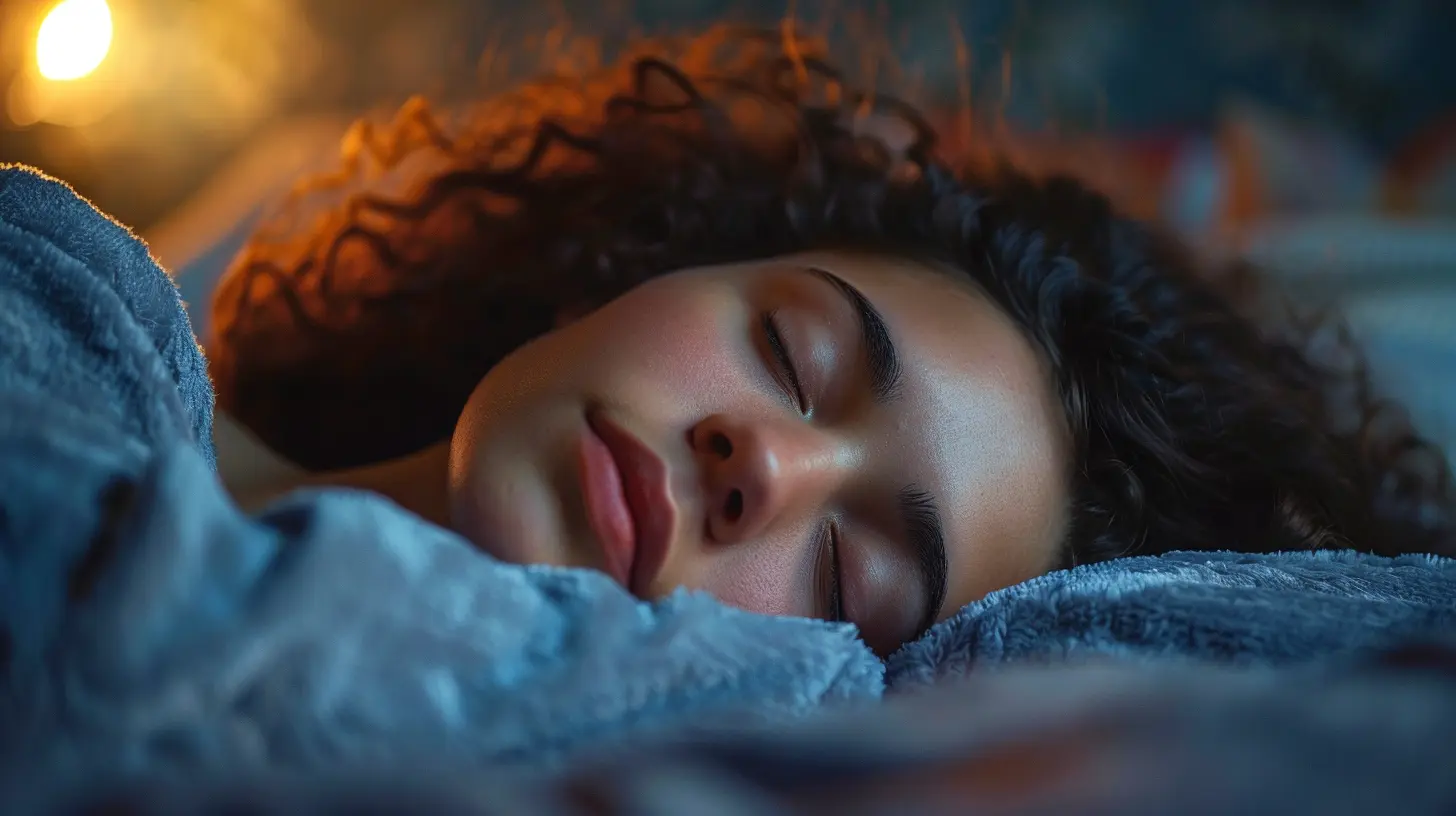How Sleep Affects Your Mental Health and Mood
15 August 2025
Let’s be honest—most of us have sacrificed sleep to binge a show, finish a project, or scroll endlessly on our phones. It feels harmless in the moment, right? But here’s the kicker: sleep is way more than a recharge button. It plays a major role in how we feel emotionally, how our mind works, and how we handle everyday life.
You’ve probably noticed it yourself—after a bad night’s sleep, things just feel… off. Maybe you’re snapping at people, feeling extra anxious, or struggling to concentrate. These aren’t just coincidences—they're your brain’s way of waving a little white flag, begging for some decent rest.
In this article, we’ll take a deep dive into the fascinating connection between sleep, mental health, and your daily mood. So grab a cozy blanket (why not set the sleepy mood?) and let’s chat about why your brain loves bedtime more than you think.
Why Is Sleep So Important, Anyway?
Think of sleep as your brain’s overnight cleaning crew. While you’re snoozing, your brain is busy processing memories, clearing out toxins, and resetting emotional circuits that get fried during the day. It’s the unsung hero behind your productivity, mood stability, and ability to handle stress.Missing out on quality sleep? It’s like showing up to a marathon with untied shoes. You might get through it, but not without tripping a few (or many) times.
The Sleep–Mental Health Cycle: It’s a Two-Way Street
Here’s the tricky bit—sleep and mental health are tangled up in a constant back-and-forth relationship. Poor sleep can lead to mental health issues, and mental health issues can wreck your sleep. It's a chicken-and-egg situation, and sometimes the lines are blurry.Here’s how it plays out:
- Lack of sleep messes with emotional regulation. Ever noticed how things feel more dramatic or stressful when you’re tired? That’s because your amygdala (the brain’s emotional command center) goes into overdrive, while the prefrontal cortex (the logical part) checks out.- Stress and anxiety ruin your sleep. Racing thoughts, tight chest, and all the “what ifs” at 2 AM? That’s anxiety making a mess of your bedtime routine.
- Sleep disorders and mental illness often go hand in hand. Conditions like insomnia, sleep apnea, and restless leg syndrome are common in people with depression, anxiety, and bipolar disorder.
Bottom line? It’s all connected.
How Poor Sleep Specifically Affects Your Mental Health
Let’s break it down. What exactly happens to your mind when you skimp on sleep?1. Increased Anxiety
When you don’t sleep enough, your brain stays in a heightened state of alertness. That’s great if you’re running from a lion, but not so great when you’re trying to make small talk at a dinner party.Studies have shown that sleep deprivation cranks up activity in the amygdala (remember, the emotion center), making even minor concerns feel like giant threats. In short, everything feels worse.
2. Higher Risk of Depression
Chronic sleep deprivation is strongly linked to depression. We’re talking about a deep, persistent sadness that doesn’t go away after a nap. People with insomnia are about ten times more likely to have clinical depression compared to those who sleep well.And here’s the kicker: depression can also cause insomnia. See the cycle?
3. Mood Swings and Irritability
Ever been called cranky after a sleepless night? Guilty. Sleep debt affects the brain’s ability to regulate chemicals like serotonin and dopamine—aka your “feel-good” hormones. Without them balanced, you're like a soda bottle that's been shaken... just waiting to pop.4. Cognitive Fog and Decision-Making Issues
Sleep stores the day’s new info, like saving files to your mental hard drive. Without it, you struggle to focus, remember important stuff, or make good decisions. Your brain is basically operating with too many open browser tabs and not enough RAM.
How Much Sleep Do You Really Need?
Now, you might be thinking: “Okay, okay... I get it. Sleep matters. But how much do I actually need?”Well, the sweet spot for most adults is between 7 to 9 hours per night. Teens need even more—around 8 to 10 hours. Everyone’s different, though. Pay attention to how you feel during the day. If you're yawning non-stop or chugging coffee like water, your body’s trying to tell you something.
Quality Over Quantity: It’s Not Just About Hours
Here's the twist — even if you’re clocking in 8 hours, poor-quality sleep can still leave you mentally drained.Think of sleep like a sandwich. You can have a long one filled with fluff, or a shorter one packed with nutritious goodness. Which one fuels you better?
Here are signs your sleep quality might be off:
- Frequent waking up during the night
- Waking up feeling tired
- Loud snoring (could be sleep apnea)
- Trouble falling asleep in the first place
If these sound familiar, it's not just about getting to bed earlier—it’s about improving the quality of your zzz’s.
Why Good Sleep Boosts Your Mood (And Mental Health)
Alright, enough doom and gloom. Let’s talk about the good stuff: how regular, restful sleep can seriously boost your mental well-being.1. Better Emotional Resilience
When your sleep is on point, you can handle life’s curveballs with more grace. You won’t break down over spilled coffee or scream in traffic. Instead, you’re calmer, more patient, and a lot more pleasant to be around.2. Improved Focus and Productivity
Sleep recharges your brain so you can tackle problems creatively and efficiently. It's like giving your mind a morning espresso shot without the caffeine crash.3. Stable Mood
Say goodbye to rollercoaster emotions when your sleep habits are solid. You’ll find yourself less reactive and more balanced overall.Tips to Improve Your Sleep—and Your Mental Health
If your sleep game is weak right now, don’t worry. Improving it doesn’t have to be complicated or expensive. Let’s go over some simple lifestyle changes that can work wonders.1. Stick to a Sleep Schedule (Even on Weekends)
Your body loves rhythm. Try going to bed and waking up at the same time every day—even Saturday. Yes, even then. It trains your internal clock to fall asleep and wake up naturally.2. Create a Wind-Down Routine
Your brain needs cues that it’s time to chill. Think dim lights, calming music, tea, reading, or stretching. Avoid screens—they’re like a disco ball for your brain.3. Watch What and When You Eat
Avoid caffeine late in the day and big meals right before bed. Your digestive system needs downtime too.4. Limit Screen Time Before Bed
Blue light from phones and TVs messes with your melatonin (the sleep hormone). Try switching to night mode or, better yet, ditch the screen an hour before hitting the hay.5. Make Your Bedroom a Sleep Sanctuary
Cool, dark, and quiet. That’s the sleep trifecta. Invest in blackout curtains, white noise machines, or comfy bedding—whatever makes your space feel like a cozy cave.6. Don’t Stay in Bed Tossing and Turning
If you can’t sleep after 20 minutes, get up and do something relaxing (read, meditate). Lying there frustrated only makes it worse.When to Seek Professional Help
If you’ve tried all the tricks and still struggle to sleep or notice persistent mental health issues, don’t tough it out alone. Talk to a doctor or therapist. There may be deeper sleep disorders or emotional conditions at play that need professional care.Sleep isn’t a luxury—it’s essential. And sometimes, getting help is the strongest, smartest move you can make.
Final Thoughts
Here’s the truth: sleep isn’t just "nice to have"—it’s non-negotiable if you want to feel mentally and emotionally your best. It's the foundation upon which your mood, creativity, memory, and resilience are built.Think of it as mental hygiene. You wouldn't skip brushing your teeth every day, right? So why skip giving your mind the rest it needs?
Make sleep a priority, not an afterthought. Your brain, and honestly everyone around you, will thank you.
all images in this post were generated using AI tools
Category:
Mental WellnessAuthor:

Angelo McGillivray
Discussion
rate this article
1 comments
Derek Blevins
Sleep is vital for our mental well-being. Prioritizing rest can lead to improved mood and emotional resilience. Remember, it's okay to seek help if you're struggling. You are not alone.
September 1, 2025 at 5:05 AM

Angelo McGillivray
Thank you for highlighting the importance of sleep for mental health! Prioritizing rest is indeed crucial, and seeking help is always a positive step.


